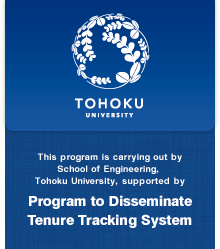| 2003 | Completed Master Course Integrated Design Engineering, Graduate School of Science and Technology, Keio University |
|---|---|
| 2004 | Junior Research Associate, Ohmori Materials Fabrication Laboratory, RIKEN |
| 2006 | Completed Doctor Course Integrated Design Engineering, Graduate School of Science and Technology, Keio University |
| 2006 | Collaboration Researcher, Advanced Development & Supporting Center, RIKEN |
| 2007 | Collaboration Researcher, Ohmori Materials Fabrication Laboratory, RIKEN |
| 2009 | Special Postdoctoral Researcher, Ohmori Materials Fabrication Laboratory, RIKEN |
| 2011 | External Collaborative Researcher, Sophia University |
| 2012 | Collaboration Researcher, Ohmori Materials Fabrication Laboratory, RIKEN |
| 2012 | Associate Professor, Department of Mechanical Systems and Design, Tohoku University |

Masayoshi
MIZUTANI
Associate Professor, Department of Mechanical Systems and Design,
Tohoku University
Profile
Keywords
Micro/Meso Mechanical Manufacturing (M4 Process), Laser Process, Powder Jet Deposition (PJD), Functional Interface, Biomaterials, Bio-Medical Applications, Biomimetic Surface
Toward the practical use of next-generation biomedical materials that uses Nano precision manufacturing process
New techniques are needed to enhance manufacturing competitiveness and ensure Japan’s leadership position. One such technique is the creation of “functional interfaces” for material surfaces manufactured using micro/meso-scale mechanical methods. These methodologies will enable the creation of highly functional “next-generation” materials that are polished and shaped using nano technologies.
We can envisage biomedical materials applications and devices, such as dental implants, and artificial joints, organs, and blood vessels. In addition, as the aging population increases, we can reduce the burden on the elderly and those who need biomedical materials owing to injury or disease by using a durable device that not only serves its defined function in a human body but also shows a high affinity for human tissues and cells.
We continue our efforts in research because we believe that the domestic production of new biomedical materials would improve the competitiveness of Japan’s manufacturing sector. Currently, approximately 90% of biomedical materials are imported. More importantly, providing biomedical devices specifically designed for the Asian skeletal structure and unique habits and postures, such as the Japanese style of sitting, would be of great benefit to our population.









